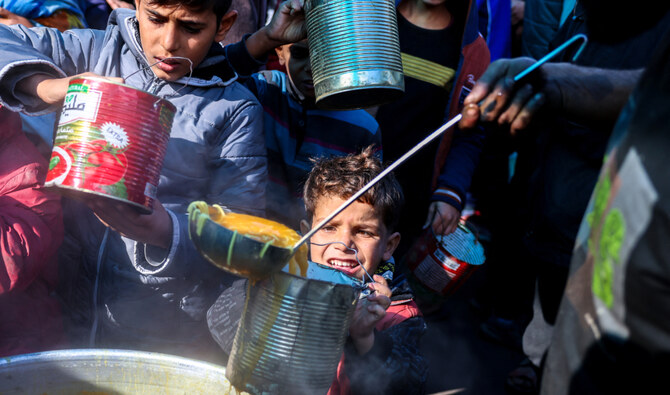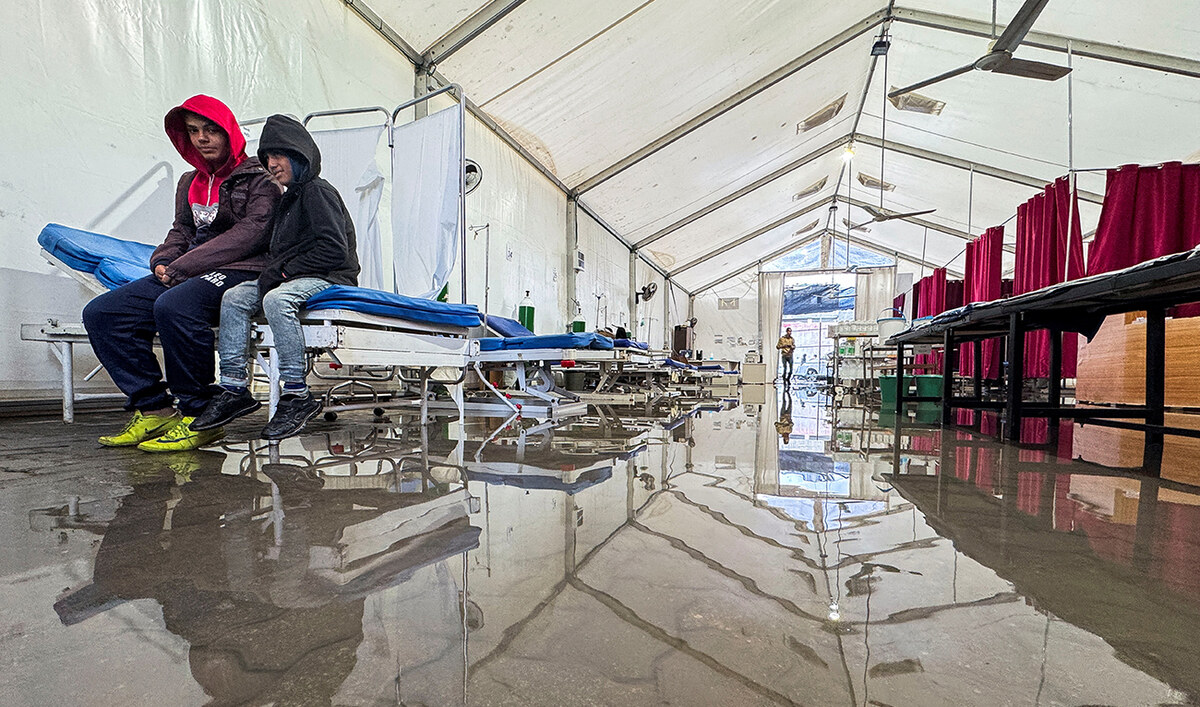LONDON: As the war in Gaza approaches its 16th month, Palestinian civilians trapped inside the besieged territory hold out little hope of a respite, despite international calls for a ceasefire between Israel and Hamas.
On Dec. 11, the UN General Assembly adopted two key resolutions, demanding an immediate, unconditional, and permanent ceasefire in Gaza, as well as the immediate and unconditional release of all hostages.
The Assembly also reaffirmed its full support for the mandate of the UN Relief and Works Agency for Palestine Refugees in the Near East, UNRWA, considered a lifeline for millions, and condemned Knesset legislation, passed on Oct. 28, barring the agency’s work.
Since Oct. 7, 2023, when the Palestinian militant group Hamas launched a surprise attack in southern Israel that killed 1,200 people and saw 240 taken hostage, the Israeli military has bombarded Gaza and restricted the flow of aid into the territory.
The strikes have killed at least 44,900 Palestinians, according to Gaza’s health ministry, destroyed homes, health, education, and sanitation services, and displaced some 90 percent of the population — many households multiple times.

A picture shows the damage to ambulances at the Kamal Adwan Hospital in Beit Lahia the northern Gaza Strip on October 26, 2024. (AFP)
Israel’s blockade of at least 83 percent of humanitarian relief entering Gaza, and the looting of those aid convoys that do get through, has led to severe food shortages and crisis-level hunger affecting more than two million people.
In early December, the World Food Programme warned that “Gaza’s food system is on the brink of collapsing,” highlighting “a high risk of famine” for everyone in the enclave.
In the north, where no aid has arrived for almost three months, some 65,000 Palestinians face an imminent threat of famine. The independent Famine Review Committee warned in November that in this part of Gaza, “famine thresholds may have already been crossed or else will be in the near future.”
Gaza’s health authority reported on April 1 that 32 people, including 28 children, had died from malnutrition and dehydration in hospitals in the north. In March, the World Health Organization documented cases of “children dying of starvation” at Kamal Adwan and Al-Awda hospitals.

In the south, where aid is more accessible but still insufficient, UN agencies reported in mid-February that 5 percent of children under the age of two were acutely malnourished.
For this reason, along with other alleged war crimes relating to the Gaza war, Israeli Prime Minister Benjamin Netanyahu and former Defense Minister Yoav Gallant have been threatened with arrest if they travel to any of the 124 member states of the International Criminal Court.
In late November, the ICC issued warrants for Netanyahu, Gallant, and Hamas commander Mohammed Deif, who Israel says it killed in July. The ICC prosecution has said it is not in a position to determine whether he was killed or remained alive.
The ICC said Netanyahu and Gallant “bear criminal responsibility” for “the war crime of starvation as a method of warfare; and the crimes against humanity of murder, persecution, and other inhumane acts.”
For Deif, meanwhile, the ICC found reasonable grounds to believe he was “responsible for the crimes against humanity of murder; extermination; torture; and rape and other form of sexual violence; as well as the war crimes of murder, cruel treatment, torture; taking hostages; outrages upon personal dignity; and rape and other form of sexual violence.”

Gaza’s health authority reported on April 1 that 32 people, including 28 children, had died from malnutrition and dehydration in hospitals in the north. (AFP)
Some governments and international organizations have gone further. A recent report by Amnesty International concluded that Israel “has committed and is continuing to commit genocide against Palestinians in the occupied Gaza Strip.”
South Africa was among the first countries to accuse Israel of genocide against Palestinians in Gaza. The country even brought a case against Israel to the International Court of Justice, which, in January, found it “plausible” that Israel has committed acts that violate the Genocide Convention.
At least 14 countries worldwide — including Spain, Belgium, Turkiye, Egypt, and Chile — have joined or signaled their intention to join South Africa’s case against Israel.
The ICJ ordered Israel to ensure “with immediate effect” that its forces not commit any of the acts prohibited by the convention. The conflict and restrictions on the flow of aid have nevertheless continued.
The already catastrophic humanitarian situation in Gaza is expected to deepen when the Knesset’s ban on UNRWA operations comes into effect in the new year.

A man carries a box of relief food delivered by the UN agency supporting Palestinian refugees (UNRWA), at Bureij camp in the Gaza Strip on December 5, 2024. (AFP)
In January, Israel accused several UNRWA employees of involvement in the Oct. 7, 2023 Hamas-led attack, leading many Western donors to suspend funding while the agency investigated the allegations.
After confirming the involvement of nine employees, UNRWA fired them, and all donors, except the US, reinstated the money.
Reports indicate Israel’s bombardment has destroyed at least 70 percent of UNRWA schools in Gaza — 95 percent of which were being used as displacement shelters at the time of the attacks.
Israel says its forces aim to minimize civilian casualties and accuses Hamas of using civilian infrastructure to shield its military operations — an accusation Hamas has consistently denied.

This picture shows destruction at the site of an Israeli strike that targeted the Musa bin Nusayr School in the Al-Daraj neighbourhood in Gaza City on December 22, 2024. (AFP)
International organizations have repeatedly stressed that nowhere in Gaza is safe — not even Israel’s designated “safe zones.”
Displaced Palestinians in Al-Mawasi camp in southern Gaza, which Israel claims is a safe humanitarian zone, came under Israeli bombardment on Dec. 4.
Since the war began, Al-Mawasi has been home to hundreds of thousands of displaced Gazans, as Israeli evacuation orders repeatedly directed fleeing families there.
In central Gaza, an Israeli airstrike on Al-Aqsa Martyrs Hospital in Deir Al-Balah on Oct. 14 started a fire that swept through a crowded camp.
In the north, Kamal Adwan Hospital in Beit Lahiya has been a target of Israeli raids. The region’s last partially functioning medical facility endured months of heavy shelling and a renewed blockade.

An Israeli airstrike on Al-Aqsa Martyrs Hospital in Deir Al-Balah on Oct. 14 started a fire that swept through a crowded camp. (AFP)
Despite denials from local medics and Hamas of any militant presence at Kamal Adwan, Israel continued to batter the facility with heavy airstrikes. In late December, Israeli forces arrested the hospital’s director, Hussam Abu Safiya, and closed the facility in a deadly incursion.
Nevertheless, public criticism of Hamas is increasing in Gaza, both in public spaces and online. Some Gazans have accused the group of placing hostages in apartments near crowded marketplaces or of launching rockets from civilian areas.
Salman Al-Dayya, one of Gaza’s most prominent religious figures, issued a fatwa in mid-December condemning those who fire rockets from civilian areas and from among tents, thereby drawing Israeli fire.
This followed an earlier fatwa in November condemning the Oct. 7, 2023, attack on Israel. Al-Dayah, a former dean of the Faculty of Sharia and Law at the Hamas-affiliated Islamic University of Gaza, accused the militant group of “violating Islamic principles governing jihad.”
Despite this, many Gazans remain loyal to Hamas, and after years of repressive rule, it is unclear whether the group is genuinely losing support or if existing critics now feel safer expressing their views.

Although the death of Yahya Sinwar, the mastermind behind the Oct. 7, 2023 attack, was deemed a defining moment in the Gaza war, Netanyahu made it clear the conflict is not over. (AFP)
Many thought there was a chance the war would end on Oct. 17 when Yahya Sinwar, the mastermind behind the Oct. 7, 2023, attack, was killed after a chance encounter with an Israeli patrol in Rafah, southern Gaza.
Other Hamas leaders killed by Israel over the past year include Saleh Al-Arouri, the deputy chair of Hamas’s guiding council, killed in January in a suspected Israeli strike on Beirut; Marwan Issa, deputy commander of the Al-Qassam Brigades, killed in March in Nuseirat Camp, central Gaza; and Deif, Sinwar’s closest aide, reportedly killed in July in Al-Mawasi.
Ismail Haniyeh, the political leader of Hamas, was killed in July when a bomb exploded in his bedroom at a government guest house in Iran’s capital Tehran.

Civilians check the site of an Israeli strike in a residential area at Tuffah neighbourhood, east of Gaza City, on December 26, 2024. (AFP)
Although Sinwar’s death was deemed a defining moment in the Gaza war, Netanyahu made it clear the conflict is not over. In a post on X, he wrote: “While this is not the end of the war in Gaza, it’s the beginning of the end.”
Benny Gantz, a member of the war cabinet, meanwhile, went further, saying Israeli forces would continue to operate in Gaza “for years to come.”




























